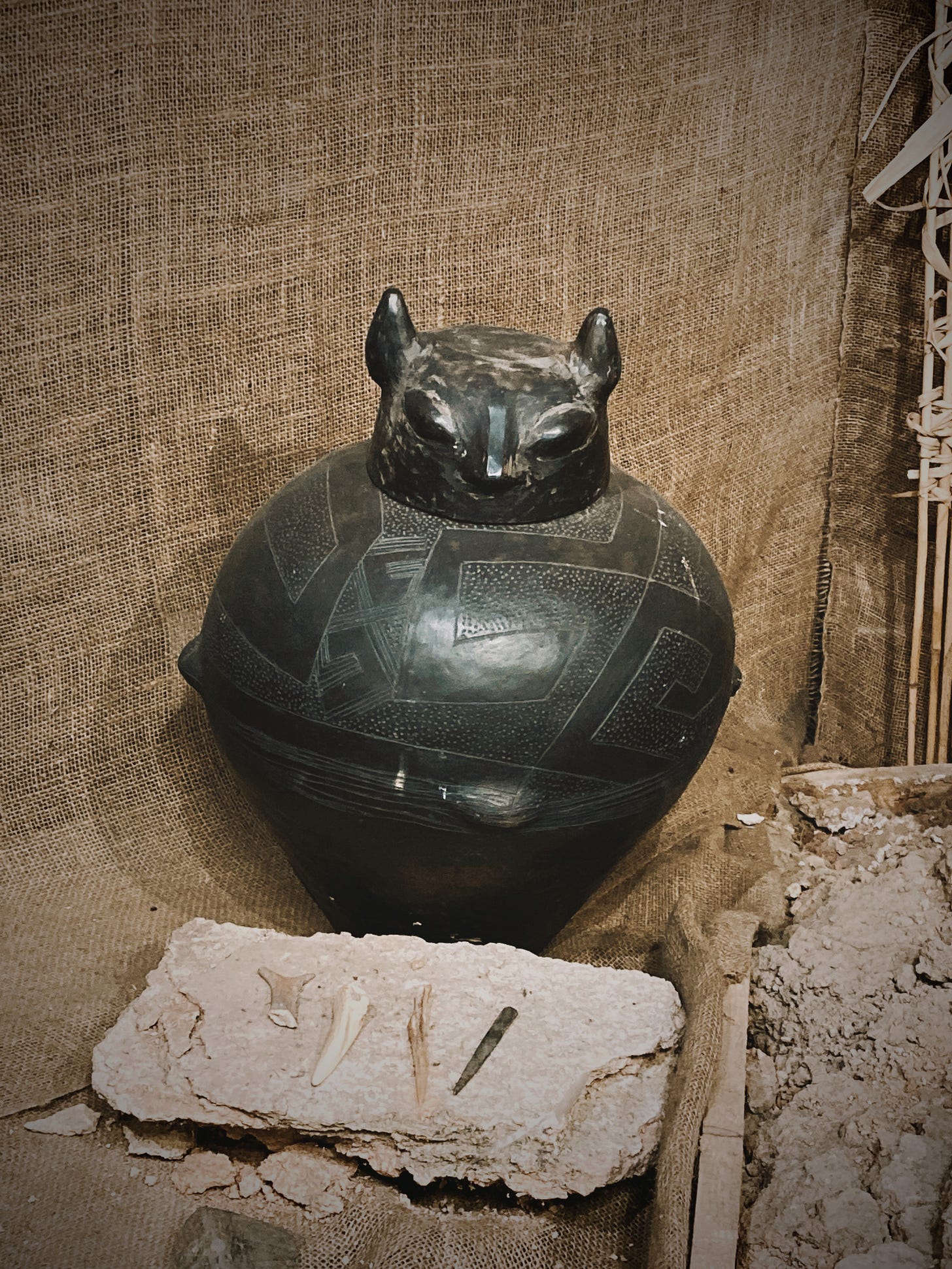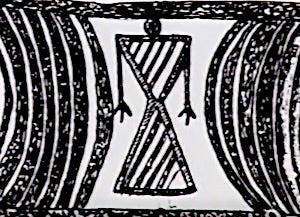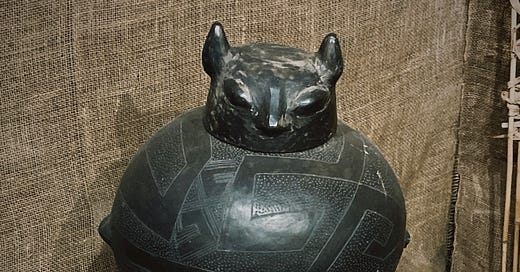Naming our Gods : The Spiritual Amnesia of the Modern World
Monthly Newsletter | Australia, June 2023

Listen via audio
This monthly newsletter has taken a slightly different shape. I set out to write the usual poem and musings on where I am now - having just arrived to Australia - but my pen took a different turn, and I followed suit. I suppose this is a topic that’s never really too far from my thoughts, and not having really written about it before, I sense it would be a good thing to offer it here as what I hope might be a resource for anyone wrestling with notions of belonging, identity and their place within the modern spiritual worldview.
So this one’s a bit tongue in cheek. I promise I’m not outwardly trying to be provocative here, or to disrespect anyone’s practice or belief system. It’s tricky to write about these things without ruffling a few feathers, but I do hope that it’s received with the spirit with which it is intended, which is essentially an inquiry into how we can do a little better in these fragile and unprecedented times.
We can be pretty lazy with our language in the modern spiritual world. It’s not particularly unusual to hear very old terms flung around without consideration of their original meaning or cultural context. We sandwich Sanskrit concepts like karma, chakras, shakti and samadhi in between sips of cacao from Central America before plunging into a sweat lodge originally meant for male initiation through the Maternal Womb.
It is assumed that if we identify as “spiritual” in the modern world, our belief system will revolve loosely around something like a plant-based diet, a regular yoga practice, the occasional cup of Ayahuasca and the reluctance to kill a mosquito based on a majorly misinterpreted and complex Brahmanic belief system about reincarnation.
We will likely map our bodies based on the Sanskrit chakra system; colour-coding and crystal adorning to enhance whichever energy circuit may feel out of balance on any given day.
We will see the Full Moon as bringing endings, the New Moon beginnings, and the time in between a sort of grey area where we get another go at “evolving” or “ascending” before we ‘release that which no longer serves us’ on the next Full Moon.
The outer world is here to serve us, replete with messages and symbols crafted for us and us alone. Any bird that flies a particular way does so to tell us something - its entire existence being wholly in our service. And if a car number plate has triple digits, well, the angels have dropped everything to come close.
I’m not so sure how different this all is to the medieval belief that we are at the centre of the universe and the heavens spin around us.
It seems like there’s a bit of a remnant of a human-centric belief here.
But I sense that it’s much more likely that the natural world isn’t actually that interested in us.
This is not to say that we should diminish ourselves because of the harm we have caused on the planet and retreat into an existence of self-flagellation, but rather, to realign with our place in the world - adopting a stance that is interrelated and interdependent with all of life. Not at its centre nor needing to retreat into the periphery.
I fear we risk falling into another form of colonialism and power over the Earth by seeking to combine originally separate beliefs and worldviews for our own benefit.
We exploit language, extracting and taking what serves a narrative that best suits us, and we marry terms that were originally separated by time and space to create our worldview.
This is modern spirituality in a nutshell.
By no fault of its own, the westernised world is generally unaware that it has its own spiritual inheritance. This is by consequence of the successful cultural and spiritual genocides that took place throughout European history at the hands of numerous mass-invasions and erasures of oral, indigenous, traditional and folk Knowledge.
And so I’d like to share a brief chronology of the moments in history that contributed to the western world’s spiritual amnesia.
The first of these took place during the Indo-European Invasions of Neolithic Europe. These happened in three waves, from approximately 4500 - 2500 BC. By the end of the last invasion, the traditions, customs and stories of the Old Europeans were near-wiped out. This is known as the Kurgan Hypothesis and was developed by Lithuanian archaeologist Marija Gimbutas.

We then have the Mycenaean invasion of Bronze Age Crete in circa. 1450 BC. Minoan Crete was one of the last Old European cultures that survived the Indo-European Invasions and became home to many of its refugees who were, to a degree, able to preserve some of the old ways. The Minoan customs continued, again to a degree, under the Mycenaean occupation. Predominantly because the Mycenaeans actually enjoyed some of the old Minoan customs and integrated them into their own belief systems.
When the Mycenaeans invaded Crete, many Minoan refugees in turn fled to mainland Greece and set up temples in both Delphi and Eleusis - both becoming two of the most important religious centres in ancient Europe.
And so the old customs somewhat survived throughout prehistory, under the imposition of first the Indo-Europeans, and then the Mycenaean civilization.
The next attempt at suppressing the old ways in ancient Europe came with the Romans. They did a particularly good job at painting the indigenous oral European cultures as barbarian and unsophisticated, and enforced mass-conversion to the Roman pantheon and allegiance to Roman law.
And finally, we jump forward to medieval Europe, and come to the Inquisition, the most recent suppression of the older customs. And as is well known, the extremism of the brutality all but near-crushed any remnants of the old European world.
All these movements can be understood as cultural and spiritual genocides; or genocides of old, oral Knowledge. Their aim was to eradicate the native traditions in Europe and replace them with their own.
As a result of this history of invasion and religious imposition, the West is suffering from a type of spiritual amnesia.
And so in the late nineteenth-century, individuals starting with Helena Blavatsky, Annie Besant and Alice Bailey, and through into the twentieth-century with Rudolf Steiner, Carlos Castaneda, Richard Alpert (later Ram Dass) and Timothy Leary (to give some examples), set out on a plight to fill in the gaps in western memory and re-create a spiritual tradition.
This marked the beginnings of the New Age Movement, bringing together an eclectic array of traditional belief systems from Buddhism, Taoism, paganism, tarot, yoga, astrology and magic… and resulting in the modern spiritual creed that we know today.
Now, by creating a spiritual tradition that is essentially a melting pot of cross-cultural beliefs and is comprised of a language that was fundamentally created for the benefit of the western mind, I fear we risk falling into the same mindset as that of the initial invasions and suppressions of a very old, oral, earth-centric, and life-affirming Knowledge.
As a result of this amalgamation, we name our gods by other names. The Earth everywhere has become the goddess Pachamama of the peoples of the Andes or Gaia of the ancient Greeks.
And these titles have gendered the natural world, turning the Sun and Sky into the Father, and all that is Earthen becoming the mother.
We know the sea as the Afro-Brazilian Yemanja or the Greek Aphrodite, but we have forgotten that it is also the pre-Christian Gaelic deity Manannán mac Lir and the pre-Hellenic Oceanus.
Oral cultures had names for both female and male gods of the earth and heavens. The Earth deity in the ancient Mediterranean, for instance, was both Demeter and Dionysus.
Our modern binaries inhibit both men and women from the possibility of a fullness of experience; one in which a man is both stellar and earthen, and women are not limited to the Earth planes but can access the heavens too. An obvious danger of this gendered pantheon is the restriction of women to the material world, and the doctrine that men must transcend it (and therefore women).
This is just one example of the way our pick-and-choose spiritual language has created a limited worldview for us all at best, and a flawed one at worst.
I hope it is clear here that I am not dismissing the truths in the cross-cultural traditions that modern spirituality has drawn from. It is no doubt true that the human body has a glandular system surrounded by magnetic fields. But I wonder how our sense of self and belonging to place might deepen if we retrieved our own cultural ways of relating with these systems. What was our early ancestors name for the chakras?
A good starting place to understand the energetic body map from the European and Middle Eastern perspective would be through the Kabbalah and Alchemy. I bring these parts of the world up in tandem because Europe was highly influenced by the Middle East in the medieval period. Both the Kabbalah and Alchemy offer a map into the energetics of the human body and the circuits that ancient India called chakras, from within the European context.
Perhaps I also need to be clear here that I’m not saying I think we shouldn’t study spiritual teachings outside of our own cultural heritage, but rather that knowing our own inheritance can enrich and reinforce anything else that we learn. This is because knowing our own spiritual inheritance means knowing our place in the world. It means belonging.
A spirituality that is not rooted in place is one that becomes one-sided and unilateral, not unlike the dogmatic beliefs within institutionalised religion.
How long can we really keep drawing on terms, concepts and practices from an array of cultures to create and uphold our spiritual cosmologies and worldviews?
I wonder what might shift in us if we sought to retrieve our own spiritual inheritances. Say, the beliefs and practices from oral cultures in the Pyrenees, the Mediterranean islands from Italy and Malta, or the pre-Islamic Atlas Mountains of North Africa…
Who were the gods of our ancestors? And what might we dream into being if we called them by their names?
Announcements
As usual, I will be running the monthly New Moon Embodiment for women, and the Dismemberment Ceremony on the last Sunday of the month (open to all). Please scroll down for all the details.
—
Upcoming New Moon Embodiment: Sunday June 18th, 8 - 9:30pm UK
Movement can be one of the greatest sources of support, healing and transformation. Once a month, on every New Moon, we seek to return to the body in a 90 minute guided movement meditation that draws on experiential embodiment practice and the exploration of altered states through dance.
These ceremonies take place monthly, on every New Moon.
Open to anyone who identifies as a woman or with the inner womb space.
—
Dismemberment Ceremony: Sunday June 25th, 8 - 9:30pm UK | £22
Initiatory teachings tell us that we must learn how to die to fully live. Spiritual deaths are ways of clearing the old debris we accumulate throughout life. In shamanism, a form of spiritual death is called dismemberment. Belonging to the family of “death mysteries,” it is a process of dissolution which may lead to renewal and a return “to the bones,” the essentials of being.
These ceremonies take place monthly, on the last Sunday of every month.
Open to all genders.




Thank you so much for writing this, it encapsulated my feelings as an English artist living on the Spanish island of Ibiza, and invested in the island's incredibly rich local folk culture and ancient mythology. Here, in New Age circles, people can share impressive repertoires of Amazonian medicine songs, but I struggle to find a single non-Ibizan who could sing me one of the island's own traditional songs, in the native 'eivissenc' language. Here, this estrangement between popular spiritual 'currency' and local indigenous culture has a serious and deeply troubling side-effect: indigenous ceremonies from South America are commonly incorporated into the entertainment programmes of luxury hotels which do nothing less than colonise and gentrify the island, repressing its own indigenous population whilst celebrating 'indigenous spirituality'.... This taboo that you are breaking is such an important one, and I'm trying to do the same over here!
Such an interesting piece. Lots of food for thought …